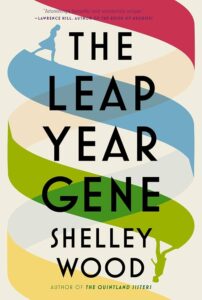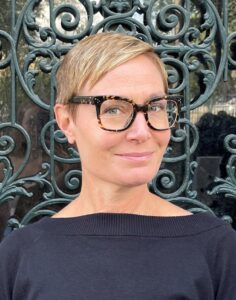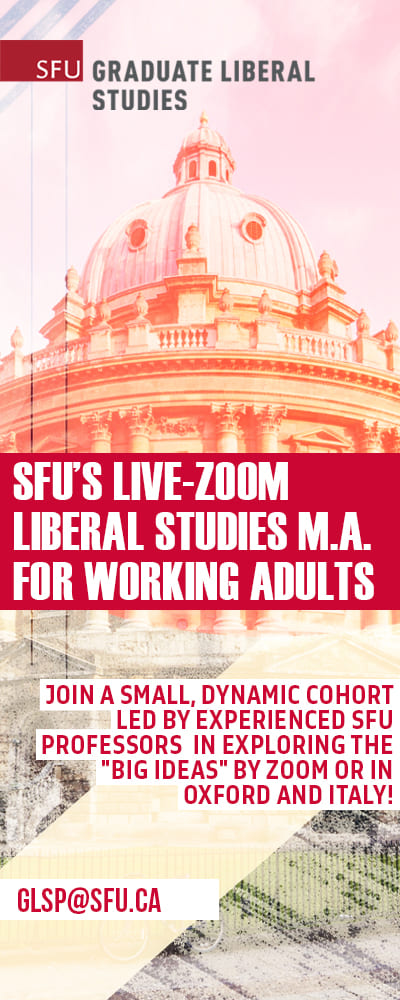‘Love and the chance to hold on to it’
The Leap Year Gene
by Shelley Wood
Toronto: HarperCollins Canada, 2024
$25.99 / 9781443473163
Reviewed by Jessica Poon
*

The Leap Year Gene is an engaging historical epic novel where DNA is seemingly paramount. Fundamentally, though, it is a poignant family novel. In her sophomore novel of Kelowna- and Sechelt-based Shelley Wood (The Quintland Sisters) asks what we are willing to risk and sacrifice for love.
In 1916, Ernest McKinley opens the door to an unexpected guest—his sister-in-law, Natalie. Ernest’s brother, Tom, died in war, leaving behind Lillian, a botanist who’s become a recluse, partly because she’s grieving, but also because her pregnancy has long exceeded nine months. When Natalie asks Ernest to help, the unusually lengthy pregnancy causes Ernest to question whether Lillian is even pregnant with Tom’s child. One doctor suggests the trauma of Tom’s death has caused Lillian’s pregnancy to continue for an abnormally lengthy duration.
When the baby is finally born, on February 29—the titular leap year—she’s healthy. But Katherine—often called Kit—much like when she was in Lillian’s womb, has a body that is slow to age; her mind, however, is agile. After a nosy neighbour of Lillian’s insinuates that Lillian lacks propriety, Ernest proposes to her. While the scenario doesn’t exude much star-crossed romance, the two grow to love each other and Lillian occasionally compares Ernest to Tom, musings that occasionally veers into deeply awkward stuff to say to the brother of your deceased husband. It’s giving Brothers, starring Natalie Portman, at times. Although this is a novel that spans many decades, we never do learn much about Tom, other than his apparent differences from Earnest.
To avoid curiosity and suspicion, Ernest and Lillian often change nannies and homes, which inevitably leads to complications—for instance, scientists invested in eugenics in Berlin, or the overly inquisitive partner of a former nanny. In other words, to be recognized is a nightmare and perennial fear. The family eventually does have a few trusted allies—Natalie, Lillian’s sister, a fun aunt who exemplifies the single woman going through men like Kleenex; Max, a colleague of Lillian’s who becomes an uncle figure and has his own reasons to fear persecution; and Hari, who becomes close to Kit and whose grandfather has the same “leap year gene” as Kit. At one point, Lillian participates in monumental research with none other than Francis Crick and James Watson, best known for their discovery of DNA’s structure.
When Lillian and Earnest have a second daughter, Helen, her physical development is typical. It’s not long before Helen looks older than her older sister. Kit, whose life experience is not commensurate with her outer appearance, is curious about romance and sex but still looks like a child. In this pre-Google era, Kit relies on Helen and Helen’s first boyfriend, for answers. This awkward discrepancy leads to some truly cringe voyeurism on Kit’s part, to say the least.

The novel offers the third person limited perspectives of Ernest, Lillian, Helen, and finally, Kit herself. This expansive approach showcases Wood’s talent for delving into the minds of different personalities across several decades. She convincingly writes from the mind of a quiet family man; an ambitious scientist who loves her children; a nurse who both loves and resents her sister; and of course, a genetically anomalous, somewhat self-centred spitfire, who learns to lie about her age early on.
Hari, who Kit once had a crush on in her youth, marries Udita. Though initially presented as an otherworldly distillation of immense beauty, intelligence, and goodness, Udita becomes a more interesting, prominent character near the end. Udita’s struggle to cling to beauty and youth—currencies valued more than her intellect—is an interesting foil to Kit’s preternaturally slow aging; however, Udita’s larger, fiery role near the end only made me wish she had been (1) introduced earlier, and (2) had more to do and say than she’s given.
Meanwhile, Will, Kit’s childhood friend and later love interest, is a fountain of understanding and compassion, a seemingly undying love that survives Helen’s well-intentioned interception of Will’s letters. You know it’s real love when the unsent mail gets interfered with, after all. Kit, having the same fear as her parents did before Helen, is afraid to have a child who ages the way she does. Life taught her to fear persecution and to maintain secrecy. But what good is prolonging a life if you’re not living it? As Udita rightly says, “As if there’s a cure for aging! What a waste of brainpower. They could be out there curing cancer.”
Though it’s egregiously commonplace to regard art and science as binary categories, The Leap Year Gene is an effective isthmus, bridging art and science with a focus on DNA, only to reveal the emotional core of how “it’s not eternal youth we need, but love and the chance to hold on to it for as long as possible.” I couldn’t have said it better myself.
*

Originally from East Vancouver, Jessica Poon is a writer, former line cook, and pianist of dubious merit who recently returned to BC after completing a MFA in Creative Writing at the University of Guelph. [Editor’s note: Jessica Poon has reviewed books by Richard Kelly Kemick, Elisabeth Eaves, Rajinderpal S. Pal, Keziah Weir, Amber Cowie, Robyn Harding, Roz Nay, Anne Fleming, Miriam Lacroix, Taslim Burkowicz, Sam Wiebe, Amy Mattes, Louis Druehl, Sheung-King, Loghan Paylor, Lisa Moore (ed.), Sandra Kelly, Robyn Harding, Ian and Will Ferguson, Christine Lai, Logan Macnair, Jen Sookfong Lee, J.M. Miro (Steven Price), Bri Beaudoin, Tetsuro Shigematsu, Katie Welch, Megan Gail Coles, and Ayesha Chaudhry for BCR]
*
The British Columbia Review
Interim Editors, 2023-25: Trevor Marc Hughes (non-fiction), Brett Josef Grubisic (fiction and poetry)
Publisher: Richard Mackie
Formerly The Ormsby Review, The British Columbia Review is an online book review and journal service for BC writers and readers. The Advisory Board now consists of Jean Barman, Wade Davis, Robin Fisher, Barry Gough, Hugh Johnston, Kathy Mezei, Patricia Roy, Maria Tippett, and Graeme Wynn. Provincial Government Patron (since September 2018): Creative BC. Honorary Patron: Yosef Wosk. Scholarly Patron: SFU Graduate Liberal Studies. The British Columbia Review was founded in 2016 by Richard Mackie and Alan Twigg.
“Only connect.” – E.M. Forster































3 comments on “‘Love and the chance to hold on to it’”
An amazing book